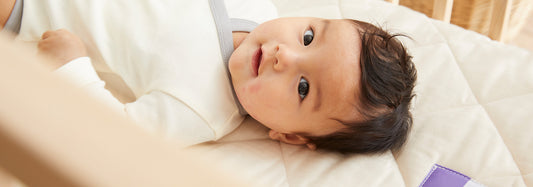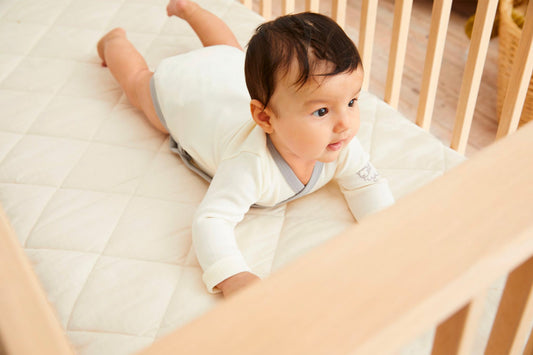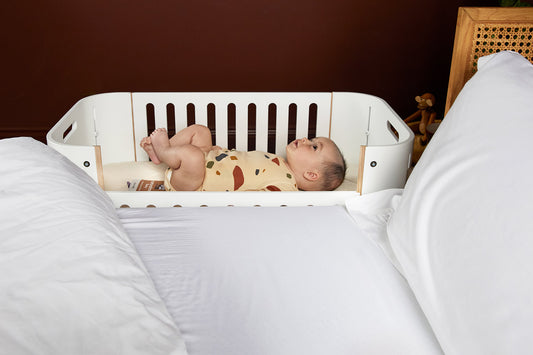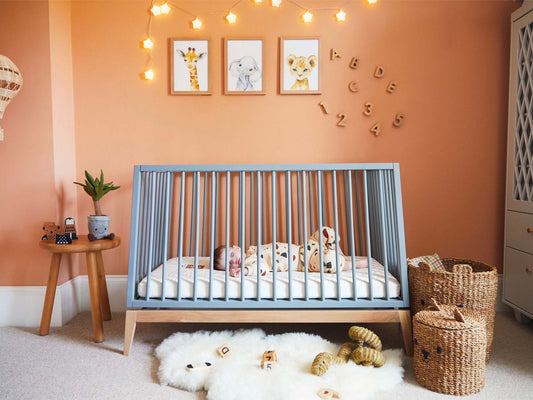It might seem like just yesterday that you brought them home from hospital, but eventually the time will come for baby to move out of their crib or Moses basket in your room, and into their very own room.
Most parents have their baby sleeping in a crib or Moses basket in their room for around the first six months. At this point, you can start thinking about moving baby into a larger sleep space. With the help of Lucy & Harriet from early-years consultancy NEST Children, we've put together this simple guide to aid you in transitioning your baby into their first room.
When Can I Transition My Baby Into Their Own Room?
There are a few key signs that it might be time to move your little one into their own room. Let's break them down:
1. They're around six months old.
For their first six months, the Lullaby Trust recommends that your baby sleeps in a separate crib or Moses basket in the same room as you.
This reduces the risk of SIDS and makes night-time care (such as breastfeeding) a bit easier. Once baby is around six months old, you can start thinking about safely moving them into their own room.
2. They're about to outgrow their crib.
The old adage is most certainly true - children grow so fast! Another sign that your baby is ready to move into a bigger sleep space, unsurprisingly, is if it looks like they're getting too big for their current crib.
This isn't just to do with their height or weight. As babies grow, their developing motor skills and inquisitiveness come into play, and they start to move around more. By moving them into a cot or cotbed with side rails, you can sleep more soundly knowing they are more secure. What's more, moving your little one into their own room will help you to begin their own independent sleep schedule.
3. You feel ready to make the move.
However cliché it sounds, one of the main signs that you're ready to make the move is actually feeling ready. Having shared a room with your baby for six months, you may now feel accustomed to their needs and sleeping habits. You may also feel that you'd like your own private space back, while enabling you to begin a stricter sleep routine for your little one in their own room. Especially if you're tired of tip-toeing around once baby is asleep in their Moses basket!
Letting go of that natural new-parent anxiety is the key to unlocking the next stage in your baby's sleeping journey, but everyone's journey is different - it's important not to push yourself. Some parents make the move at six months, whereas some parents set up a cot in their own room and share the space for beyond a year.

How Do I Prepare My Baby For The Move Into Their Room?
A few weeks before you intend on moving your baby into their own bedroom, start off by putting them in that room during their daytime naps. If baby is sleeping in a Moses basket, you could start off by putting their Moses basket in the cot for them to get used to the different environment.
We would encourage you to place a video monitor in your little one’s room when you start introducing these transition naps. This gives you peace of mind, enabling you to keep a close eye on them whilst also getting them used to you not being around.

How Can I Make My Baby More Comfortable In Their New Room?
Alongside napping your baby in the room, spend time with them in there too - this could be whilst sorting out the washing or simply reading a book, for example. Your comforting presence will help your baby adjust to the space, therefore making it less daunting when it comes to making the shift.
You can build positive associations to the room by spending time and playing in it together. Allow your little one to unwind in their cot and have a kick around, perhaps putting a mobile above the cot to entertain them while you prepare the room for their arrival.

What Do You Recommend for Their First Cot or Cotbed?
In line with the Lullaby Trust’s Safer Sleep Guidelines, we recommend a firm, flat and waterproof mattress such as either our Coco Mat or Latex Mat, with an Organic Cotton Waterproof Mattress Protector. In terms of furniture, we offer a great range of sustainable cots & cotbeds from great nursery brands including Stokke, Leander and Oliver Furniture. We've carefully curated our range to pair only the most natural & chemical-free furniture with our cot mattresses & bedding.
Make sure to follow Clear Cot Guidelines - meaning no pillows, duvets, cot bumpers, soft toys, loose bedding or products (such as wedges or straps) that will keep your baby in one sleeping position. Any room they sleep in should be between 16°c and 20°c - a room thermometer can help to monitor this.
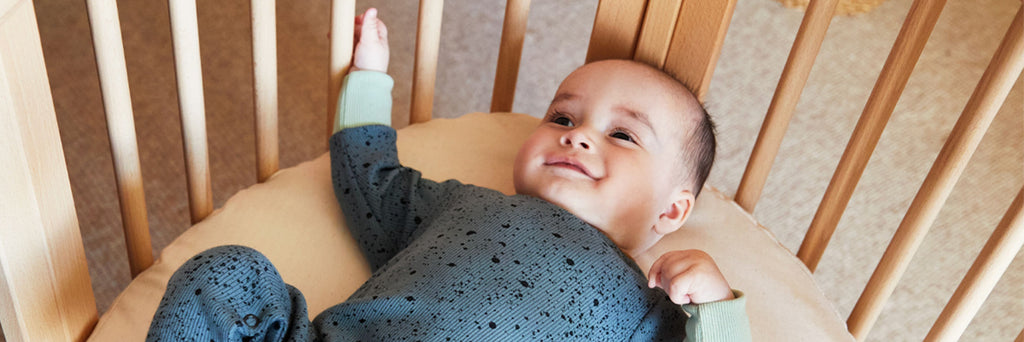
Making The Move Into Their Room
Once you feel comfortable that your baby is getting used to their room - we find that this usually takes a fortnight or so - take the plunge and give it a go! Continue practising your regular bedtime routine together (remember - consistency with the bedtime routine is absolutely key - this will ensure successful bedtimes!), and make sure to use soft lights and calming mannerisms as to not overstimulate them.
For safety and peace of mind, continue using a video or audio monitor between your room and theirs, and make sure to check on them regularly as you would have done when they were in your room. With time and patience, you’ll soon have your baby sleeping independently in no time - next thing you know, it’ll be time for their first grown-up bed!

Sleep Safely.
Whatever journey you choose for your child, it's important that you do it as safely and healthily as possible. A great resource is the Lullaby Trust's Safer Sleep Advice. The Lullaby Trust is a UK-based charity who provide expert advice on safer sleep for babies, raise awareness of SIDS, and provide support to bereaved families.
About NEST
In early 2022 we were happy to welcome Lucy and Harriet from Early Years Consultancy NEST to the Naturalmat Baby family, as our first ever dedicated Nursery Sleep Experts. Founder Lucy and parenting consultant Harriet together have a combined experience of over 25 years, and are both qualified Norland Nannies.
Together they feel passionate about supporting families to gain the knowledge they need for those early moments of parenthood, and to give parents and caregivers the confidence they need to feel they can be the best parents possible.



